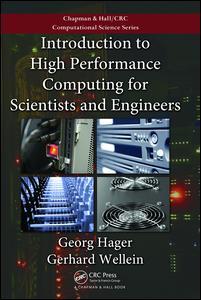Introduction to High Performance Computing for Scientists and Engineers Chapman & Hall/CRC Computational Science Series
Auteurs : Hager Georg, Wellein Gerhard

Written by high performance computing (HPC) experts, Introduction to High Performance Computing for Scientists and Engineers provides a solid introduction to current mainstream computer architecture, dominant parallel programming models, and useful optimization strategies for scientific HPC. From working in a scientific computing center, the authors gained a unique perspective on the requirements and attitudes of users as well as manufacturers of parallel computers.
The text first introduces the architecture of modern cache-based microprocessors and discusses their inherent performance limitations, before describing general optimization strategies for serial code on cache-based architectures. It next covers shared- and distributed-memory parallel computer architectures and the most relevant network topologies. After discussing parallel computing on a theoretical level, the authors show how to avoid or ameliorate typical performance problems connected with OpenMP. They then present cache-coherent nonuniform memory access (ccNUMA) optimization techniques, examine distributed-memory parallel programming with message passing interface (MPI), and explain how to write efficient MPI code. The final chapter focuses on hybrid programming with MPI and OpenMP.
Users of high performance computers often have no idea what factors limit time to solution and whether it makes sense to think about optimization at all. This book facilitates an intuitive understanding of performance limitations without relying on heavy computer science knowledge. It also prepares readers for studying more advanced literature.
Read about the authors? recent honor: Informatics Europe Curriculum Best Practices Award for Parallelism and Concurrency
Date de parution : 11-2017
15.6x23.4 cm
Date de parution : 07-2010
Ouvrage de 300 p.
15.6x23.4 cm
Thèmes d’Introduction to High Performance Computing for... :
Mots-clés :
Cache Line; NUMA; high performance computing; MPI Process; computer architecture; Omp Parallel; parallel programming; MPI Library; multicore architecture; MPI Call; affinity; MPI Implementation; sequential optimization; Load Imbalance; parallel computing; SGI Altix; distributed computing; Vector Triad; performance modeling; Double Precision; performance optimization; Domain Decomposition; microprocessors; PPPP; OpenMP; MPI Communication; cache-coherent nonuniform memory access (ccNUMA); 32k L1; message passing interface (MPI); IBM Blue Gene; hybrid programming; MPI Parallelization; MPI Rank; MPI Standard; MPI Program; Parallel Region; MPI Code; Shared Memory Parallel Programming; Vector Cpu; Send Buffer



